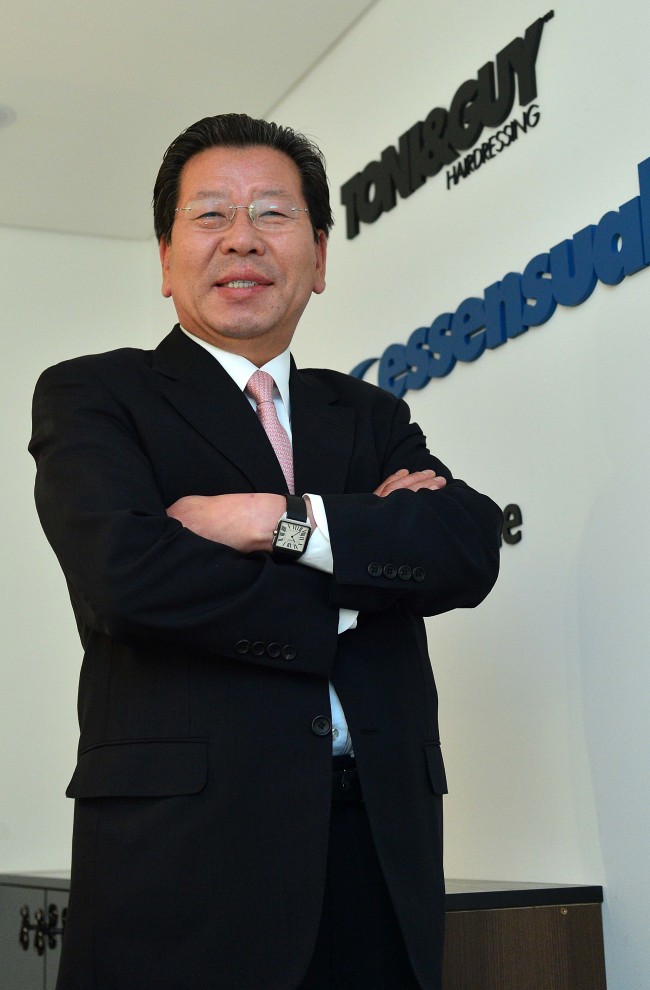When Kim Dae-sik was tapping British brands to bring to Korea in the early 1990s, not many were interested.
It wasn’t until about 10 years later when U.K. labels such as Lush started launching here.
“Back in the early ’90s, a lot of British people didn’t even know where Korea was,” Kim, chief executive of Toni & Guy Korea, said in an interview with The Korea Herald.
Kim, who had been working for Samsung C&T in London since 1989, then set his eyes on the popular hairdressing brand thanks to his wife Chung Song-joo who successfully ran a hair salon in New Malden a suburb of London.
The hairdressing and training business, founded in London in 1963 by brothers Toni and Guy Mascolo, has about 500 salons across 42 countries including 21 in Korea. Kim plans to increase the number here to 30 this year.
“Vidal Sassoon reigned as the leader of the global hairdressing business until the 1990s, but after him, there was no such prominent figure in the industry. Then Toni & Guy started to rise,” Kim said.
 |
Kim Dae-sik, chief executive of Toni & Guy Korea. (Lee Sang-sub/The Korea Herald) |
“Toni & Guy, winner of dozens of British hairdressing awards, now provides the most renowned training programs for hair designers around the world, for which we send our designers from Seoul to London once or twice a year.”
When Kim opened his first Toni & Guy salon in Seoul in 1994, it was not an exclusive partnership. Other people were running Toni & Guy salons in places including in front of Sungshin Women’s University.
The other franchises, however, lost the headquarters’ trust by causing problems such as unilaterally opening an academy using the Toni & Guy name and making it a national network.
In 2001, Kim inked a master franchise contract with Toni & Guy and became the sole operator of the salons in Korea.
Toni & Guy Korea sends about 10 percent of the fees it receives from the franchised salons to the London headquarters and imports Toni & Guy hair products to sell them through street shops and the Internet.
“The biggest difference between us and other hairdressing chains in Korea is that the British Toni & Guy art team visits Seoul twice a year to unveil the latest trends and train our designers,” Kim said.
“Our hair designers get advanced training through the professional academy as Toni & Guy Korea sponsors six to eight weeks of training in London.”
The annual collection books, video materials and posters produced at the London headquarters are widely respected and referred to by customers and experts.
Despite the expanding business, Kim is often bothered by the fact that many young staff these days lack sincerity and professionalism.
“Those who work as Toni & Guy staff for about two years and eight months are given the chance to go to London for up to eight weeks of training, which is quite costly. Quite a few of them quit after returning from London, saying they are ill, and later open their own salons,” he said.
While a number of local junior colleges have “beauty art” departments that train makeup, hair design artists and skincare specialists, most of the graduates don’t have the skills required on the job, according to Kim.
“The colleges teach theories on makeup, hair design and skincare for the first two years of the four-year curriculum, and the students choose their major in their third year. They know about things in their heads but can’t actually perform at the salons what they have learned in school,” he said.
Toni & Guy runs the technical training courses for Seokyeong University’s department of beauty art and offers scholarships.
On June 30, Toni & Guy is planning a charity hair show in Seoul in celebration of the company’s 50th anniversary with Toni Mascolo, chief executive of the hairdressing empire, attending.
All of the revenue will go to the Korea Heart Foundation, to help children with heart diseases, and several orphanages.
By Kim So-hyun (
sophie@heraldcorp.com)








